
Parkinson’s disease – Symptoms and treatment
Parkinson’s disease is a neurological disorder that affects the central nervous system and causes damage to the movement and functioning of the motor nerve. This disease is incurable; however, treatments can help relieve the symptoms. This disease is not fatal in nature but can cause extreme disabilities like paralysis. It is likely to affect older people, especially those above sixty years of age.
The different stages and symptoms of Parkinson’s disease
The early symptoms of Parkinson’s disease could also point to any other disease; however, only a neurologist can diagnose Parkinson’s. Different warning signs of this disease are as follows:
- Change in handwriting due to difficulty in controlling movement.
- The initial stages of tremor that can be felt by the patient themselves and might not be noticeable to others.
- Difficulty in movement and stiffness in muscles.
- Patients might experience changes in voice in the early stage of Parkinson’s.
- Small changes of posture are one of the early signs of Parkinson’s.
Learning about the different stages of Parkinson’s, along with their symptoms, can help in understanding the stage a patient is currently in. The different stages of Parkinson’s are as mentioned:
- Stage 1 : Patients at this stage feel tremors in one side of the body, accompanied by muscle stiffness in the knees and legs. They might not feel any pain, however. Patients can experience acute constipation as well. They also experience changes in postures or facial expressions.
- Stage 2 : In this stage, tremors and muscle rigidity spread to both sides of the body. They are likely to experience more apparent poor posture and have difficulties in walking. Performing daily activities becomes more difficult.
- Stage 3 : This stage involves slow movement and frequent falls. Patients experience problems in carrying out daily activities like eating or getting dressed.
- Stage 4 : The symptoms get quite severe at this stage. Patients need assistance in walking and carrying out daily activities.
- Stage 5 : This is the most advanced stage, wherein the rigidity of the muscles reaches such a level that patients either need a wheelchair for their movement, or they are completely bedridden. Constant nursing care is required to carry out day-to-day activities. Delusions and hallucinations are common at this stage.
Treatment of Parkinson’s disease
The exact causes that lead to Parkinson’s disease are yet to be identified. As a result, the treatment of this disease doesn’t depend on the causes; rather, it depends highly on the symptoms. There is no prevention or complete cure for this disease as it is a progressive disease, so early detection can help in relieving the symptoms associated with this disease.
Different medication in different doses is prescribed to treat the symptoms associated with this disease. Additionally, regular exercising and complementary therapies are also suggested. Drugs for this disease might have different reactions with food or with other medication. The patient is required to discuss with their physician about the possible reactions of these drugs.
Parkinson’s disease can affect anyone, and there is no way to prevent this disease. The only way to help a patient is by providing assistance to carry out their daily activities and medical assistance to relieve the symptoms.



